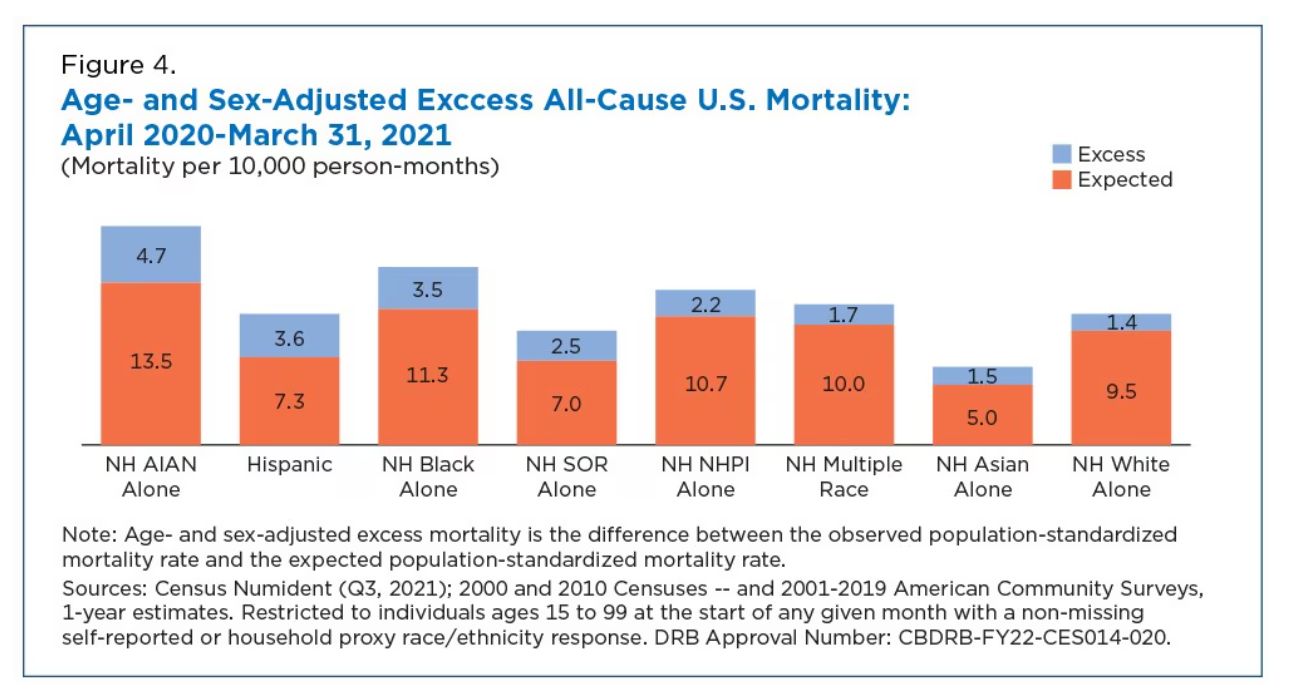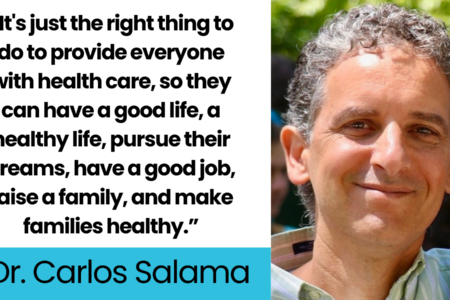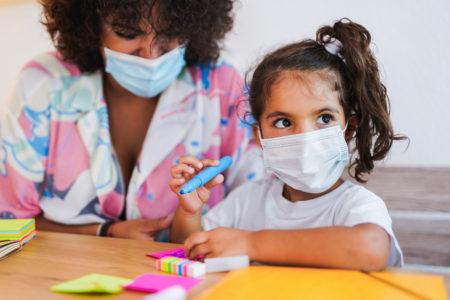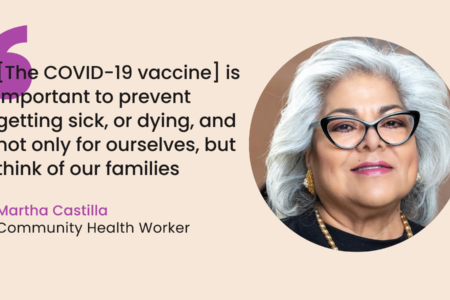
Share On Social!
COVID-19 “completely erased the mortality advantage” that the Latino population had compared to the White population, according to new data from the U.S. Census Bureau.
Let’s dive into the new data on Latino mortality.
What Is Excess Mortality?
The Census Bureau refers to excess mortality as deaths from any cause above what is expected from recent mortality trends.
Excess mortality is calculated as the difference between the actual mortality rate and the mortality rate expected to see in the hypothetical absence of the COVID-19 pandemic.
“An additional 573,000 people died in the United States during the first year of the COVID-19 pandemic but ‘excess mortality’ at the national level masks substantial variations by state, age, sex, and race and ethnicity,” according to the new data.
What Is Excess Mortality by Race/Ethnicity?
Mortality rates differ, with or without the pandemic.
For example, the average White person is older than the average Latino person. Because mortality increases with age, mortality rates tend to be higher on average for the White population than the Latino population.
But the COVID-19 pandemic “wiped out” this mortality advantage.
Latinos experienced among the highest rates (3.6 per 10,000 persons-months) of excess all-cause mortality during the first year of the pandemic, far surpassing the rate of their White peers (1.4 per 10,000), according to the Census data.
Also, Latinos endured the biggest increase in mortality during the pandemic — 49.1% higher than expected based on pre-pandemic mortality trends.
Similarly, the new data found substantial excess mortality among younger working-age (25-64) Latino, Black, and American Indian or Alaskan Native populations.
“This research shows the pandemic widened the mortality gap between the nation’s Black and White populations and completely erased the mortality advantage of the Hispanic population in relation to the non-Hispanic White population,” according to the Census Bureau.
Why Are We Seeing Excess Mortality among Latinos?
The Census data reflect how the pandemic worsened social determinants of health (SDoH).

The COVID-19 pandemic heightened social and health issues like poverty, income and jobs, education, housing, transportation, air quality, and access to healthy food, green spaces, and health care. The Latino population bore a heavy brunt of these inequities.
“These findings point to the social and economic determinants of health, which also contributed to racial and ethnic mortality gaps for years before the pandemic began and drove disproportionate increases in excess mortality among racial and ethnic minorities in the pandemic’s first year,” the Census Bureau states.
The Importance of COVID-19 Vaccination
This information reinforces the important of COVID-19 vaccines.
The COVID-19 vaccine is available for free for adults and children, according to the You’re Covered website led by the COVID-19 Vaccine Education and Equity Project.
Use Vaccines.gov to find a location near you.
Then call or visit their website to make an appointment.
Find additional vaccine information on the You’re Covered website in English and Spanish.
Dr. Ramon Cancino, a family medicine physician at UT Health San Antonio and leader of the UT Health Physicians Primary Care Center, stressed the importance of getting vaccinated.
“If we have enough folks who are vaccinated in our community, it’ll protect everybody else, too, because transmission and infection rates would be decreased amongst those patients, which would decrease the risk for everybody else,” Cancino said.
Still Undecided on COVID-19 Vaccination?
To encourage Latinos to get vaccinated, Salud America! at UT Health San Antonio is sharing stories of real Latinos who are squashing misinformation and getting vaccinated.
Take, for example, Rosa Herrera.
Rosa was hesitant to get the COVD-19 vaccine after reading misinformation on Facebook.
However, after COVID-19 hit close to home, causing her children to become hospitalized, and several of her other family members getting vaccinated, Herrera began to reconsider.
After more research and consideration, Herrera decided to get vaccinated.
Now, Herrera helps others schedule vaccination appointments!
“I tell them, ‘I already did it, you can do it! Nothing is going to happen to you. Nothing happened to me,” Herrera said. “But then at the same time, I let them know that everybody reacts differently because, we’re not all the same. But I think it’ll be better for them to get the vaccine to protect themselves, but mainly for their family members.”
Find COVID-19 vaccination locations near you in English and Spanish.
Explore More:
COVID-19By The Numbers
142
Percent
Expected rise in Latino cancer cases in coming years



